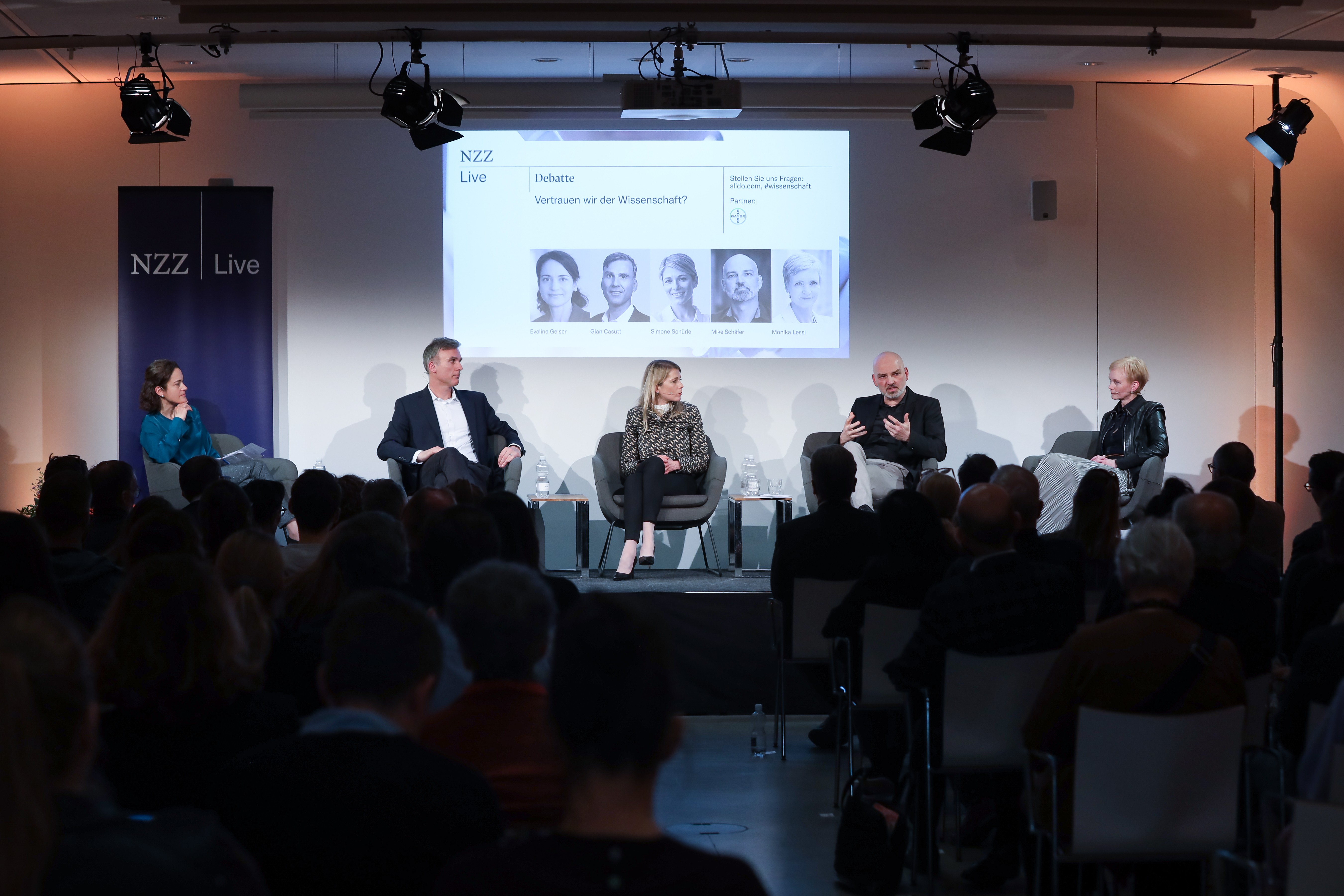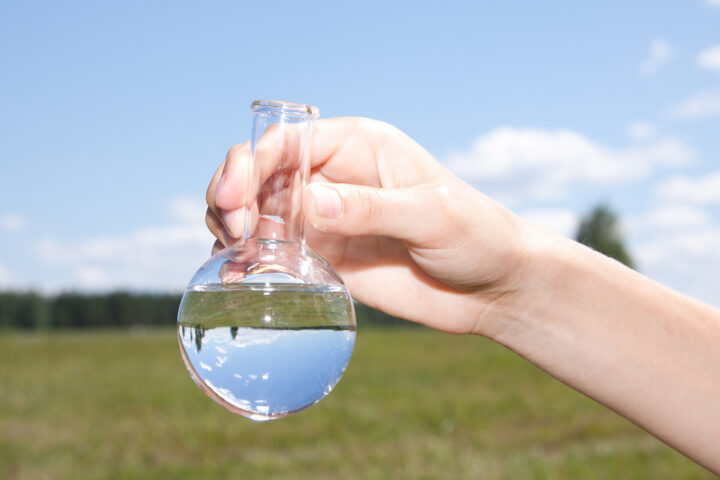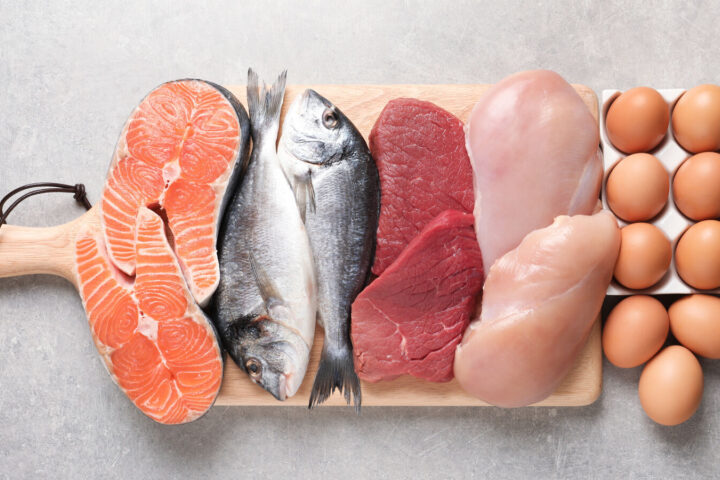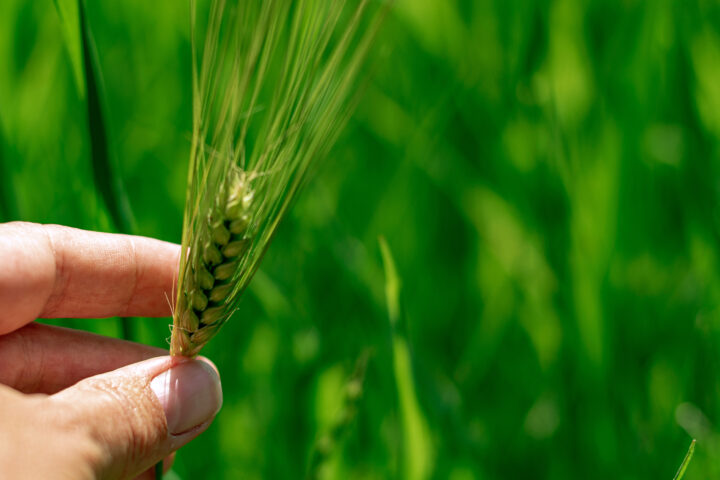
Why trust in science is so important
It is essential that society has confidence in research. Only in this way can it realise its maximum potential and ultimately overcome social challenges such as climate change or a pandemic. But there are also critical voices: Some of the Swiss population has little or no trust in science. Four experts debated how research can gain people's trust at an «NZZ Live» panel discussion.
Monday, February 26, 2024
The coronavirus pandemic has shown just how essential science is for our society. If we are in a crisis, we are dependent on it. However, in order for us to fully benefit from the findings of researchers, it is important that people have confidence in science.
The «NZZ Live» panel discussion on 7 February addressed precisely this topic. The event entitled «Do we trust science?» was organised by NZZ and the global life sciences company Bayer. Under the direction of NZZ science editor Eveline Geiser, four experts debated the importance of transparency in research results, the role of science for society and the possibilities for strengthening trust in science.
Present were Gian Casutt, Head of Communications ETH Board, Monika Lessl, Head of Corporate R&D and Social Innovation at Bayer, Mike Schäfer, communication scientist at the University of Zurich and Simone Schürle, engineer in the Department of Biomedical Engineering at ETH Zurich. «Swiss people's trust in science is already relatively high and has even increased during the pandemic,» said Mike Schäfer. According to the Science Barometer Switzerland 2020, around two thirds of those surveyed stated that they had a strong or very strong trust in science.

According to experts, however, trust in science has waned again since the pandemic. This could jeopardise public investment in research and ultimately Switzerland's reputation as a successful nation of science and innovation. For Monika Lessl, the pandemic period was a prime example of how science works. «Recommendations were constantly adapted based on new findings.» The experts see science-related populism and the spread of misinformation as the reason for dwindling trust. According to the NZZ report, others question the independence of research, as it is partly funded by third parties. Still others are concerned about the consequences of gene and cell modifications.
Overall, the experts at the panel discussion agreed that science is dependent on the trust of society. Casutt said that communication must explain science and its work. For Monika Lessl, too, it is clear that trust is not simply a given, but must be won again and again. «There needs to be a constant exchange between science and society,» emphasised Lessl.
Bayer has therefore now created a publicly accessible database in which people can see which universities the company is working with and what they are currently researching. The aim is to create transparency – and ultimately trust.
Kindly note:
We, a non-native editorial team value clear and faultless communication. At times we have to prioritize speed over perfection, utilizing tools, that are still learning.
We are deepL sorry for any observed stylistic or spelling errors.
Related articles

«You cannot vote on science»
Resistance to new technologies is currently booming. In the case of green genetic engineering, politicians are also finding it difficult to deal with new technologies in a forward-looking way. But where does this fear of new things come from? Ludger Wess, science journalist and molecular biologist, talks about this in the Swiss-Food Podcast.
Content in German

«Switzerland is the most patent-intensive country in the world»
Patents protect innovation and at the same time they drive innovation. During our Swiss-Food Talk on August 15, three innovation experts discussed the importance of patents for the Swiss economy.

Agriculture between science and marketing
ORF's Eco Special examines the question of how plant breeding and genetic engineering work. The programme speaks plainly: All breeding is an intervention in the genes. Whether maize or carrots, ever since humans have been breeding, they have been changing the DNA of their seeds in order to produce plants with ever better properties. And products advertised as "GMO-free" have long since contained genetic engineering - even in organic products.

Why Strict GMO Regulation Stifles Innovation
New breeding techniques such as CRISPR-Cas are considered key to developing resilient crops, stable yields and reducing the need for plant protection products. ETH professor Bruno Studer warns that overregulating these technologies strengthens precisely those large agricultural corporations that critics seek to curb, while excluding smaller breeders and start-ups from the market.

A Superfood with Benefits and Challenges
Sweet lupin is Biovision’s “Superfood of the Year 2026.” It delivers high protein content, improves soils and supports biodiversity. Yet a closer look at agricultural practice shows that without breeding, crop protection and innovation, even this superfood remains a challenging crop.

Sales bans due to PFAS: Should we be worried?
After spectacular sales bans on fish and meat due to PFAS contamination, consumers are asking themselves: How dangerous are these substances really – and what can still be placed in the shopping basket without concern?

How German Experts View New Breeding Techniques
In hardly any other country is the idyllic image of organic farming cultivated in the public sphere as carefully as in Germany. Naturalness and rural authenticity are powerful mental refuges for many Germans. Against this backdrop, it is hardly surprising that resistance to new breeding techniques is strong – and that ignorance about the realities of organic farming sometimes appears almost deliberate.

